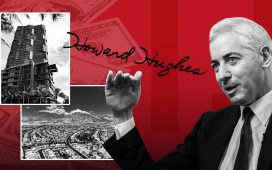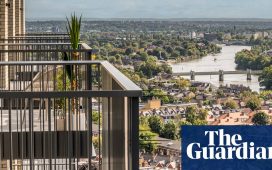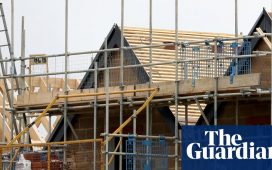Three Russian oligarchs under sanctions are among those to declare they own more than £35m of UK property through the British Virgin Islands, Cyprus and Russia, the Guardian has found.
Alexander Frolov, a billionaire and associate of Roman Abramovich, is revealed as the owner of a mansion in Weybridge in Surrey bought for £9.8m in 2008 and a flat in Knightsbridge bought for £15.4m via the BVI.
Frolov, who owns an estimated 10% stake in Evraz, a UK-incorporated mining company, was placed under sanctions last year along with co-owners Abramovich and Alexander Abramov.
The UK government said he was involved in obtaining a benefit from or supporting the government of Russia by owning or controlling directly or indirectly Evraz, an entity carrying on business in sectors of strategic significance to the Russian government, namely the Russian extractives, transport and construction sectors.

The Guardian previously revealed Frolov’s sprawling worldwide wealth but these two offshore-held properties were not identified. Frolov was approached for comment.
Igor Shuvalov, a former deputy first minister of Russia, is confirmed on the register as the ultimate owner of two flats in Whitehall Court, Westminster, metres from the Ministry of Defence. They were bought for more than £11.4m in October 2014 and held through a Russian company, Sova Real Estate LLC.
His ownership was previously alleged in 2015 by the opposition politician Alexei Navalny. According to an investigation by Navalny’s Fund for the Fight Against Corruption, Shuvalov turned the two flats into a 500 sq metre luxury apartment.
Shuvalov, a former lawyer who was seen as one of Russia’s most senior liberal figures serving in Dmitry Medvedev and Vladimir Putin’s cabinets, stood down from politics to head VEB, a state bank, in 2018. He was placed under sanctions by the UK last year.
Asked about Shuvalov’s ownership of the flats and why they were held through a company, a spokesperson for VEB said: “Given the current state of affairs between Russia and the west and taking into consideration the questions posed, one cannot expect the inquiry and following publication to be unbiased.
“Igor Shuvalov’s affairs have been regularly and rigorously scrutinised by means of control and supervision so as to ensure compliance with the law of the Russian Federation. Compliance with applicable laws is an absolute priority for Igor Shuvalov … Ownership of real estate in the UK by the Russian company Sova Real Estate is fully transparent for both Russian and UK regulators, although causing additional costs and increased tax liabilities.”
Another property is listed on the register as being ultimately owned by Vladimir Potanin, known as the “Nickel King” and believed to be one of Russia’s richest businessmen.
He is listed as the beneficial owner of part of an office block in the City of London through a Cyprus-based arm of Norilisk Nickel, of which Potanin owns about a third. Potanin was placed under sanctions last year on the basis of his involvement with Rosbank, a Russian bank.
A spokesperson for Norilisk Nickel, which is not subject to sanctions, said the City of London property was held on a long-term lease. “Since Mr Potanin is an ultimate beneficial owner of Norilsk Nickel, and in absence of other ultimate beneficial owners holding above 25%, Mr Potanin’s name is filed with the UK register of overseas entities,” they said.
after newsletter promotion

The register of overseas entities was launched last year to bring transparency to ownership of UK property. Individuals have until 31 January to declare they are the beneficial owners of overseas companies that own UK property.
The Guardian believes there is a public interest in reporting on the business interests and property ownership structures of wealthy, politically connected and influential people.
Three-quarters of the registered companies are based in five jurisdictions: the BVI, Jersey, the Isle of Man, Guernsey and Luxembourg.
Holding properties through offshore companies is legal and some individuals may have genuine and legitimate privacy or security concerns or business reasons for using them.
Experts say it can be done to minimise an individual’s tax liability as the owner or buyer of a property, or, until now, to allow a property to be held anonymously. Some investors also cite the stability of the tax regime in jurisdictions such as Jersey and Guernsey as a reason their companies are based there, or they may live abroad.










